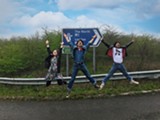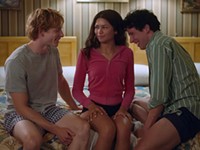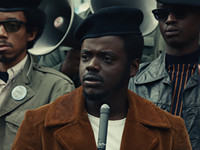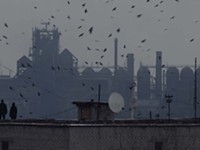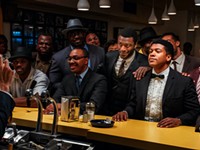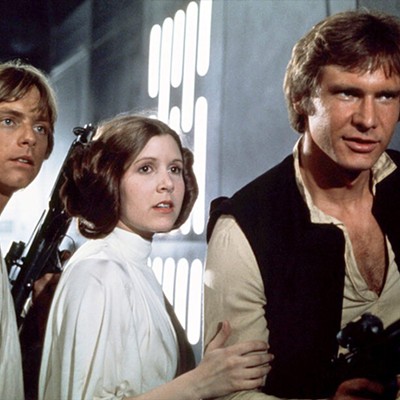[
{
"name": "500x250 Ad",
"insertPoint": "5",
"component": "15667920",
"parentWrapperClass": "",
"requiredCountToDisplay": "1"
}
]
The third of this summer's British, classic rock-based quasi-musicals (after Danny Boyle's "Yesterday" and the Elton John biopic "Rocketman"), Gurinder Chadha's "Blinded by the Light" uses the songs of Bruce Springsteen as a springboard for a crowd-pleasing jukebox rock drama that's charming and joyful, with just enough real world insight to give it some weight.
The film is set in the small English town of Luton in 1987, a volatile time when Margaret Thatcher's policies created waves of unemployment and discontentment in working class Brits across the country. The immensely likeable Viveik Kalra plays 16-year-old Javed, a young aspiring writer who yearns to escape his depressed hometown and the stifling rules of his traditional Pakistani household.
He's been keeping a diary and writing poems since he was a young boy, even acting as lyricist for his best friend Matt's (Dean-Charles Chapman) new wave band. But he keeps his aspirations a secret from his domineering, tradition-minded father, Malik (Kulvinder Ghir), who's distrustful of Western culture and tells him that writing is just for British people with rich parents.
At school he's struggling to find his place amidst Wham! boys and Bananarama girls, and the pressures from his father only get worse after he's laid off from his factory job. Javed's mother Noor (Meera Ganatra, in a lovely supporting turn) is forced to make up the missing income, taking on an unbearable amount of work with her at-home seamstressing business. It seems that something's got to give.
Particularly in its early going, the plot is not without its formulaic pieces. There's the teen rebelling against the restrictive traditions of his parents, falling for a seemingly out of his league classmate, Eliza (Nell Williams), and finding encouragement in a teacher (Hayley Atwell) who pushes him to reach his full potential.
Then a friend introduces Javed to the music of Bruce Spingsteen, whose lyrics offer a "direct line to all that's true in this shitty world." Coming at a particularly desperate moment, Springsteen's songs about being stuck in a small town rut and yearning for more strike a chord with the Pakistani teen and his dreams of escape.
Javed's initial discovery hits him like a bolt of lightning in a thrilling sequence that conveys the intensity with which Javed is connecting to what he's hearing. We see the lyrics appear in text on screen, swirling around his head, or projected on brick walls throughout the town.
Even coming from The Boss' New Jersey working-class background, the songs express feelings Javed has been struggling to put into words. He's obsessed, even as his peers don't hesitate in telling him that no one listens to Springsteen anymore, except maybe their dads.
Other songs turn into full-out production numbers, as when Javed and his friends break into the campus radio station to blast "Born to Run" over the loudspeakers or the smitten teen decides to woo Eliza with the words to "Thunder Road."
As Javed is inspired to figure out what exactly he wants out of life, comes to understand his family, and find his own voice through the music of Bruce Springsteen, the film recognizes that the deeply personal connection to art and music comes in many forms.
There are some lovely sequences, like the one in which Javed accompanies his sister to a daytime dance club for Pakistani pop music and he gets a chance to clearly see his sister for the first time: observing the way she uses dance as the sort of escape he finds in Springsteen.
As joyous and funny as the film can be, it isn't afraid to dip its toes into the political, and British Indian filmmaker Gurinder Chadha ("Bend It Like Beckham," "Bride & Prejudice") uses the story to say something about the intergenerational strain of the immigrant experience. The conflict at its heart revolves around Javed's split identity, feeling caught between being Pakistani and British, and the expectations that come with each.
It's also an unmistakable, enthusiastic middle finger to Brexit and the xenophobia that incited it. Javed and his family face racism, and even the threat of violence in his neighborhood, from members of the anti-immigrant National Front. Chadha effectively connects the film's 1980s setting to contemporary white nationalist movements gaining platforms around the world.
Inspired by journalist Sarfraz Manzoor's memoir about his childhood (Manzoor wrote the screenplay with Chadha and her husband, Paul Mayeda Berges), it's ultimately a feel-good movie about the transformative power of great art; the story of a writer driven to write by the words of another.
Even when you can clearly see the mechanics working, there's an infectious joy in its story about following your heart, and not wasting your chance or letting opportunity slip away. It's earnest and proudly, enthusiastically corny. If you're able to give yourself over to its pleasures, you might find yourself singing right along.
